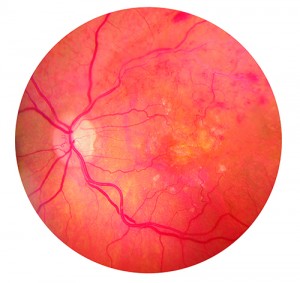 This is the most common diabetic eye disease. When diabetes is untreated, it can damage the small blood vessels in your retina, which is located in the back part of your eye. The damaged blood vessels cause bleeding, swelling and scarring that can lead to poor vision or blindness. This is called diabetic retinopathy. You usually only notice symptoms once the damage is severe.
This is the most common diabetic eye disease. When diabetes is untreated, it can damage the small blood vessels in your retina, which is located in the back part of your eye. The damaged blood vessels cause bleeding, swelling and scarring that can lead to poor vision or blindness. This is called diabetic retinopathy. You usually only notice symptoms once the damage is severe.
About
Anyone who has Type 1 or Type 2 diabetes has the potential to develop diabetic retinopathy. The longer you have diabetes, and the less controlled your blood sugar is, the more likely you are to develop this serious vision problem.
Diabetic retinopathy can result in blindness.
Symptoms
- Blurred vision and slow vision loss over time
- Shadows or missing areas of vision
- Trouble seeing at night
- Difficulty with color perception
Prevention
To prevent diabetic retinopathy you must begin by controlling your diabetes, blood sugar levels and making annual eye exams. You also need to pay attention to your vision between appointments, making sure you note any sudden or severe changes.
Diagnosis
As in any eye exam, the healthcare provider will dilate your eyes for a clear view into the eye. The provider will look for abnormal swelling, blood or dark fluid. They will also monitor your glucose levels from your primary healthcare provider’s notes on file. You may be required to have blood work done prior to the appointment.
Questions to Ask Your Health Care Provider
- Why is diabetes affecting my eye sight?
- What could I do in addition to maintaining my blood sugar levels to stop this disease?
- How often should I see my eye doctor for routine exams?
- Will I experience further vision loss?
- Will taking a vitamin or mineral supplement help prevent further vision loss?
- What’s the best way to monitor my vision for any changes?
- What low vision aids or adaptive devices might be helpful to me?
- Is it safe for me to drive?
- What types of side effects could I have from the treatments?
- If I control my diabetes, will this problem go away?
Treatments
To prevent the disease from getting worse during the early stages, you should control your levels of blood sugar, blood pressure, and cholesterol .
During the later stages, although there is no cure, your healthcare provider may recommend getting scatter laser treatment or a vitrectomy (surgery) to reduce vision loss.
Resources
For More Information Visit:
National Eye Institute
American Optometric Association
NIH Senior Health
Men’s Health Network